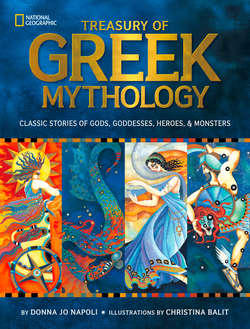Читать книгу Treasury of Greek Mythology: Classic Stories of Gods, Goddesses, Heroes & Monsters - Christina Balit - Страница 8
Оглавление
Uranus was the god of heaven. He was the brother of the sea god Pontus. And the earth goddess Gaia chose him for her husband.
Uranus spread himself over Gaia, enveloping her in that comforting way that the sky has on warm spring and summer nights. He dazzled her with stars, fulfilling the dreams that Eros had given her. He swirled through her trees, setting leaves atremble. He wafted across her meadows, freeing milkweed seeds to float everywhere, everywhere. He was tender. That’s what she loved the most. That’s what made earth and sky harmonious.
They inspired each other, and then Pontus, as well. The three were partners. Soon the lands ran with all manner of wild beasts, the skies hovered with hummingbirds and swooped with falcons, the seas teemed with gleaming fish. Under the beneficent smiles of Gaia and Uranus and Pontus, life in the universe pulsed and whispered and sang.
In those songs, Gaia bore Uranus children, so many children. A flood of sons and daughters—12 in all.
Uranus was overwhelmed. These children were strong and large. And he feared they’d take over the far reaches of the universe. One wanted to play in the deepest swirls of the water. One wanted to shine from on high even brighter than Uranus himself. One wanted to play in the darkest corners of the Underworld.
Distant Planet
The planet Uranus moves slowly and is dim. It consists of icy water, ammonia, and methane gas, surrounded by clouds of mostly hydrogen with a thin outer layer of methane. The outer layer makes Uranus appear blue-green. Winds race across its liquid surface at dizzying speeds. This cold planet is tilted so that its axis of rotation nearly faces the sun. When we look at it through a telescope, its many moons resemble circles around the bull’s-eye of a target.
An artist’s depiction of the planet Uranus
On top of that, they were unruly. One asked questions incessantly. One acted all high-and-mighty and righteous. One behaved as though she were more motherly than even her bounteous mother Gaia—what presumption! These children were driving Uranus half crazy.
They were too strong. They were too many.
He called them the Titans, which meant “stretchers,” because they wanted to stretch themselves in every direction. They wanted power. That was it! That was exactly it. And if they should decide to conspire against him …
Uranus shuddered in fear. They were his own children, but his heart turned cold at the very thought of them.
And so he trapped them inside their mother, deep within the recesses of the Earth.
Yet Gaia loved Uranus. She bore him more children, but Uranus’ fear poisoned them. They were three sons—strong, yes strapping in fact. But each had only one eye, set in the very middle of his forehead. Uranus called them the Cyclopes, which meant “wheel eyes,” and the very sight of them made his mouth go sour. Still Gaia loved Uranus. She bore him more children. By this point Uranus’ fear had turned to hatred. The children of such a father couldn’t help but be misshapen in hideous ways. They were three more sons, of exceptional power, but each had fifty heads and one hundred arms shooting from his shoulders. Uranus turned his head away, his stomach roiling.
And so Uranus kept them all—all his progeny with Gaia—imprisoned within the crevasses and caverns of the Earth.
Uranus’ fear of his Titan children poisoned him so much that his later children were all monstrous, from having only one eye to having a hundred arms and fifty heads.
Gaia moaned in pain. Her children were thwarted when they should have been thriving. What had happened to tenderness? Where had mercy gone? Her husband had become monstrous.
And so Gaia swallowed her sobs and picked up a great curved blade—the sharpest sickle. She spoke to the children within her. “Your father is evil. Listen to me. Do as I say. Then you can lead free lives.”
The children, large as they were, strong as they were, many as they were, huddled together, uncertain. How could their mother say such things? Uranus was their father.
But the youngest Titan, Cronus, didn’t huddle. “Mother, I will do the deed.” He took the sickle.
